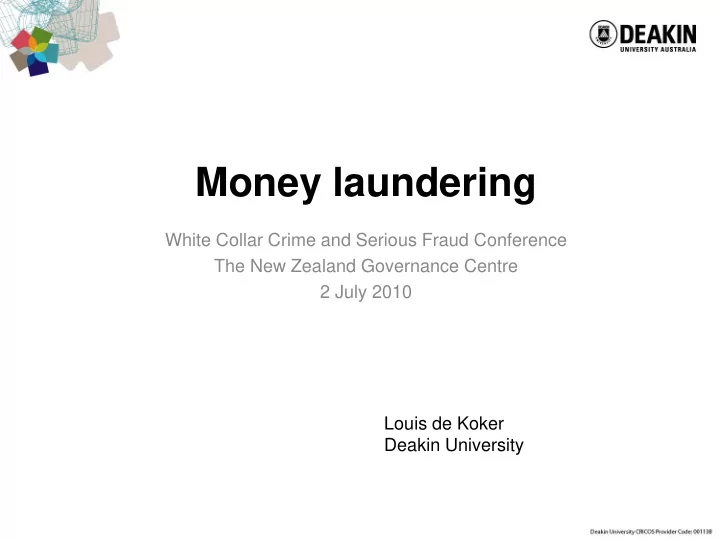

Money laundering White Collar Crime and Serious Fraud Conference The New Zealand Governance Centre 2 July 2010 Louis de Koker Deakin University
Outline • Money laundering • The concept and purpose • The FATF • An informal, non-transparent, non- representative body … with punch • The FATF Recommendations and corporate compliance responses
MONEY LAUNDERING – THE CONCEPT 3
Money laundering General definition: “any act that obscures the illicit nature or the existence, location or application of proceeds of crime” But it is not that simple – Countries criminalised specific acts within a flexible international framework
International framework The money laundering offence • Vienna Convention (1988); Palermo Convention (2000); UN Convention Against Corruption (2003); FATF Rec 1 • Broad framework allowing countries to choose direction on elements of the offences such as: – Parties – Guilt – Range of predicate offences – Criminal’s objective / intention
International framework (cont) Consequences: • What constitutes “money laundering” in one country may not do so in another • The actual offences may bear little relation to what is generally understood as “money laundering
Why was action taken against money laundering? • History • Concern about organised crime and drug trafficking • Two key ideas: • Illicit funds are dangerous • Illicit funds present a law enforcement opportunity
FATF 8
• The FATF • “An inter-governmental body whose purpose is the development and promotion of policies, both at national and international levels, to combat money laundering and terrorist financing” • AML/CFT standard-setting: • 49 Recommendations • Endorsed by UN, G20 and more than 180 countries
Exclusivity and informality FATF is exclusive, non-transparent and informal – 35 members • 33 jurisdictions and 2 regional organizations – Membership is deliberately restricted • New members (Russia and RSA (2004); China (2007); Korea (2009); India (?) (became observer in 2006) – No formal written constitution – Closed meetings
Non-members? • FATF-style Regional Bodies (FSRBs) • Other observer bodies (World Bank, IMF etc) • Indirect input Business community? • Consultative forum / Electronic Advisory Group – Indirect and limited channels
Input by members Members need to be well-resourced to carry their views within FATF • Input by country representatives are not necessarily bound by a domestic policy framework – Accountability? • Often displaying members’ interests: – Low risk / Risk-Based Approach (RBA) Despite these challenges FATF has been very influential
FATF standards • Set of “soft” (non-binding) regulatory rules • Started life as recommendations to be adopted voluntarily by FATF members • Peer group mutual evaluation • But for AML/CFT to work, non-members had to adopt measures too
Recommendation 21 “Financial institutions should give special attention to business relationships and transactions with persons, including companies and financial institutions, from countries which do not or insufficiently apply the FATF Recommendations” • Blacklisting process • Current Cooperation Review Group process • Backed by G20
FATF AND CORPORATE COMPLIANCE RESPONSES 15
Management of compliance risk “Compliance risk” is defined by the Basel Committee (2005) as “[T]he risk of legal or regulatory sanctions, material financial loss, or loss to reputation a bank may suffer as a result of its failure to comply with laws, regulations, rules, related self-regulatory organisation standards, and codes of conduct applicable to its banking activities”
Range of compliance responses Non- Liberal Conservative- Over- Complianc e Compliance Compliance Compliance Balanced compliance
Factors impacting on a corporate compliance response The hard law rule Applicable soft law Corporate compliance response The company’s Business own framework management and reality principles 18
Impact of AML/CFT • Impact on crime difficult to determine • Some positive impact • Facilitated a number of prosecutions • Increased penalties • Also some negative impact • AML/CFT as a driver of identity crimes and organised crime • Jurisdictional shifts • New Zealand?
Impact of AML/CFT (cont) • Impact on corporate practices • Corporate compliance • Business ethics - undesirable clients and business
Conclusion Louis de Koker louis@deakin.edu.au
Recommend
More recommend